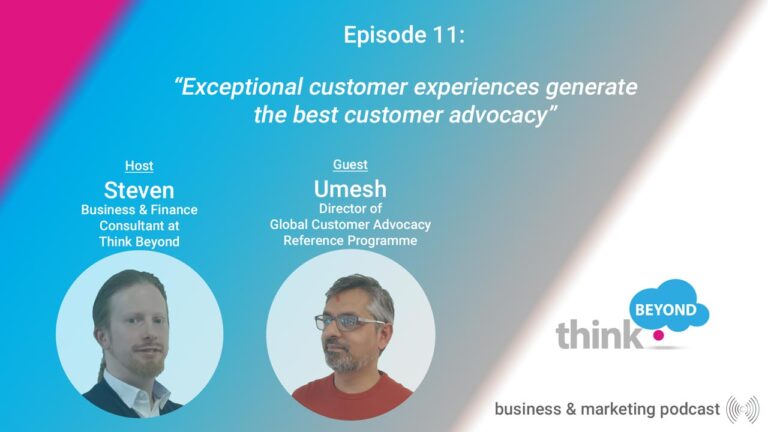After his turn in the hotseat, Steven is back as the host of podcast episode 11. Moving on from planning and change, we discuss exceptional customer experience and how it impacts customer advocacy. To aid us in this discussion, we are grateful to have Umesh Patel, an expert in the field of customer advocacy. Read on to find out more.
A staunch customer advocate
With a 30-year career and 21 years across marketing and customer advocacy, Umesh knows a thing or two about advocacy. As he leaves Fujitsu as the Head of Global Customer Reference Programme, he joins Commvault as Director of Global Customer Advocacy and Reference Programme.
Umesh resides in Manchester and is currently studying an MBA, with his dissertation looking at Customer Advocacy and its importance as the IT sector experiences changes in customer buying habits. We also know that he has a varied taste in music, loves a good home-cooked Indian meal and has the benefit of working from home. Let’s hear what he had to say.
Defining customer advocacy
Starting with the basics, Steven asked Umesh what he thinks when people mention customer advocacy. He points out that “there is no clear definition”. In his view, it means “publicly endorsing and supporting an organisation or an individual”. Umesh also sees exceptional customer experience as being “hand in glove” with generating customer advocacy. This is also the view of Think Beyond that you can’t have one without the other.
Umesh elaborates that advocacy is about “delivering on the promise”. By building on the customer experience and nurturing relationships, you deliver real customer advocacy.
The cost of buying advocacy
Steven posed an ethical question around the ‘buying’ of reviews, testimonials and advocacy. Having interacted with a litany of organisations since starting Think Beyond in October 2018, the range of possible approaches seemingly includes inducements. Umesh was categorical that advocacy “can’t be bought and shouldn’t be bought”. It should be genuine from the individual to communicate their passion about the organisation.
Umesh is aware that some technology organisations may incentivise reviews, particularly at the start of their journey. He believes that true advocacy “should be genuine” and it should be “the organisation just doing it, what they genuinely feel about that experience – that emotion”. For Umesh, the key to customer advocacy is building trust. He is keen to emphasise the potential damage that paid advocacy can cause in the long-term. Finally, he says that it is about “the quality of endorsements, not just the volume”.
Customer experience at the forefront
If CX and customer advocacy are ‘hand in glove’, just how do we put CX at the forefront of business strategy? This is more and more commonly becoming a board-level concern as Umesh attests. It should be driven from the top and the culture needs to align to customers’ best interests. Umesh suggests that “CX is one of the buzzwords” of recent years but he has never seen so much interest in it. His own experience is that the board has not always been interested but that C-SAT and CX are on the rise.
Measuring for exceptional customer experience
Steven finished by asking how the measurement of C-SAT and CX can improve. Umesh refers to C-SAT as “seasonal” and he calls for a better way to measure advocacy, not just at the end or after a milestone. Additionally, he suggests that many organisations treat C-SAT as a tick-box exercise. That is, that they don’t always follow up and action the feedback. He is excited by the “real change” that is starting to happen as boards realise the importance of advocacy. Finally, he says that all organisations need to be taking customer advocacy seriously. If not, companies will eventually lag behind their peers who achieve genuine trust. They will also struggle to get to the root of what customers feel about their experience.
Sell what they need, not what you offer
Wrapping up, Umesh adds, “don’t think about the ask of what you can get out it…put the customer at the heart.” Steven links this to various discussions and programmes around consultative solution selling in the B2B space. This involves a transformation from selling your capability to advising and partnering with a customer to solve their specific issues. Umesh agrees and this forms part of his research for his MBA dissertation. He interviewed 23 organisations and discovered that people are buying differently. Businesses need to work with customers, together arriving at the right solution. In summary, Umesh says that companies need to “co-create, work together, build a solution together, invest together – so that the outcomes are shared”.

Together on customer advocacy
A big thank you to Umesh for taking the time to record the podcast and for sharing his expert opinions on how exceptional customer experience generates the best customer advocacy. We wish him well in his new role at Commvault.
That’s 11 episodes in the bag and the response has been huge. So, why not take a listen to Steven’s turn in the hotseat and do not miss out on any of our other episodes.
Think Beyond helps boards and marketers to find new opportunities and accelerate business performance. We also believe in integrity, collaboration and respect. Our values are underpinned by PSR. A philosophy of helping you to think differently, specialist solutions to find your advantage and results focused on your performance. From CX to supporting advocacy programmes, we can help. We also offer neuroscientific techniques to help you measure CX and EX.
If you would like to find out more, why not also ask for a free initial consultation.
Check out episode 11 on Anchor, Spotify or Google Podcasts using the links below.




